No. 4.6.2
Edge Contact Repair, Film Adhesive Method
OUTLINE
This method is used to replace a damaged edge contact with a new dry film,
adhesive backed edge contact. The new edge contact is hot bonded to the circuit board
surface using a bonding iron or bonding press.
CAUTION
It is essential that the board surface be smooth and flat. If the base material
is damaged see appropriate procedure.
NOTE
This method uses replacement edge contacts that are fabricated from copper foil
and have a dry film adhesive coating on the back. They are available in hundreds
of sizes and shapes and are generally supplied nickel and gold plated. If a
special size or shape is needed it can be custom fabricated.
TOOLS & MATERIALS
Bonding Iron
Bonding Tips
Bonding System
Circuit Frames
Cleaner
Epoxy
File
Flux, Liquid
Gold Contact Repair Kit
Knife
Microscope
Oven
Scraper
Solder
Soldering Iron
Tweezers
Wipes
PROCEDURE
- Clean the area.
- Remove the defective edge contact and a short length of the connecting
circuit. Heat from a soldering iron will allow the old contact to be removed
more easily. (See Figure 1).
- Use the knife and scrape off any epoxy residue, contamination or burned
material from the board surface.
CAUTION
Abrasion operations can generate electrostatic charges.
- Scrape off any solder mask or coating from the connecting circuit. (See
Figure 1).
- Clean the area.
- Apply a small amount of liquid flux to the connection area on the board
surface and tin with solder. Clean the area. The length of the overlap solder
connection should be a minimum of 2 times the circuit width.
- The area for the new edge contact on the board surface must be smooth and
flat. If internal fibers of the board are exposed or deep scratches exist in the
surface they should be repaired. Refer to appropriate procedure.
- Select a new edge contact that most closely matches the edge contact to be
replaced. (See Figure 2).
NOTE
The new replacement edge contact may be trimmed from copper sheet.
- Before trimming out the new edge contact carefully scrape off the adhesive
film from the solder joint connection area on the back of the new edge contact.
(See Figure 3).
CAUTION
Scrape off the epoxy backing only from the joint connection area. When
handling the replacement contact, avoid touching the epoxy backing with your
fingers or other materials that may contaminate the surface and reduce the bond
strength.
- Cut out and trim the new edge contact. Cut out from the plated side. Cut the
length to provide the maximum allowable joint if lap soldering. Minimum 2 times
the circuit width. Leave the new edge contact extra long. The excess material
will be trimmed after bonding. (See Figure 4).
- Place a piece of Kapton tape over the top surface of the new edge contact. Position
the new edge contact on the circuit board surface using the Kapton tape to aid in alignment.
(See Figure 5).
NOTE
Allow the edge contact to overhang the edge of the circuit board.
- Select a bonding tip with a shape to match the shape of the new edge
contact.
NOTE
The bonding tip should be as small as possible but completely cover the entire
surface of the new edge contact.
- Position the circuit board so that it is flat and stable. Gently place the hot bonding
tip onto the Kapton tape covering the new edge contact. Apply pressure as recommended
in the manual of the repair system or repair kit for 5 seconds to tack the contact
in place. Carefully peel off the tape. (See Figure 6).
CAUTION
Excessive bonding pressure may cause measling in the circuit board surface or may
cause the new contact to slide out of position.
- Gently place the bonding tip directly onto the contact. Apply pressure as recommended
in the manual of the repair system or repair kit for an additional 30 seconds to fully
bond the contact. After the bonding cycle remove the tape
used for alignment. The new edge contact is fully cured. Carefully clean the area and inspect the
new edge contact for proper alignment.
- If the new edge contact has a connecting circuit apply a small amount of
liquid flux to the lap solder joint connection area and solder the circuit from
the new edge contact to the circuit on the circuit board surface. Use minimal flux
and solder to ensure a reliable connection. Tape may be placed over the top of
the new edge contact to prevent excess solder overflow.
NOTE
If the configuration permits, the overlap solder joint connection should be a
minimum of 3.00 mm (0.125") from the related termination. This gap will
minimize the possibility of simultaneous reflow during soldering operations.
Refer to 7.1 Soldering Basics.
- Remove the Kapton tape and clean the area.
- Trim the extending edge of the new edge contact with a file. File parallel
to the beveled edge until the excess material has been removed. (See Figure 7).
- If sealing the lap solder joint connection is required, mix epoxy and coat
the lap solder joint connections. Cure the epoxy per Procedure 2.7 Epoxy Mixing
and Handling.
CAUTION
Some components may be sensitive to high temperature.
NOTE
Additional epoxy can be applied around the perimeter of the new edge contact to
provide additional bond strength.
- Apply surface coating to match prior coating as required.
EVALUATION
- Visual examination, measurement of new contact width and spacing.
- Electrical continuity measurement.
|
|
|
Solutions Across the Board
TM
|
|
|
|
Product Class: R/F/W/C
Skill Level: Advanced
Conformance Level: High
Revision: D
Revision Date: May 8, 2001
Repair Service Charge
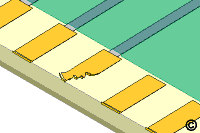
Damaged Edge Contact
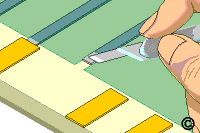
Figure 1: Remove the defective edge contact and remove solder mask from the
connecting circuit.
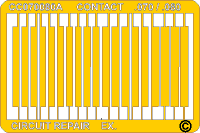
Figure 2: Select a replacement contact that matches the missing contact.
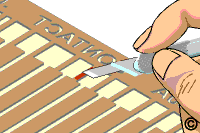
Figure 3: Scrape off the adhesive bonding film from the solder joint area on the
back of new contact.
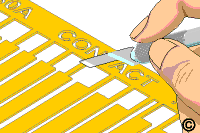
Figure 4: Cut out the new edge contact. Cut from the plated side
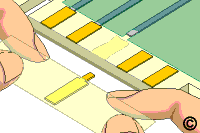
Figure 5: Place the new edge contact in place using Kapton tape.
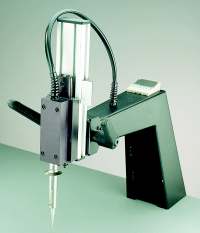
Figure 6: Bond the new edge contact with a Bonding
System.
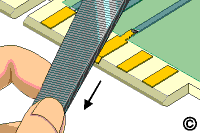
Figure 7: File overhanging piece of the new edge contact to blend with existing
bevel.
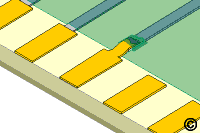
Figure 8: Completed repair.
|
Tricks of the Trade
This is a reliable method for replacing damaged or missing edge
contacts. The edge contacts we use are already nickel and gold plated. See Circuit Frames for more information.
|
|
|
